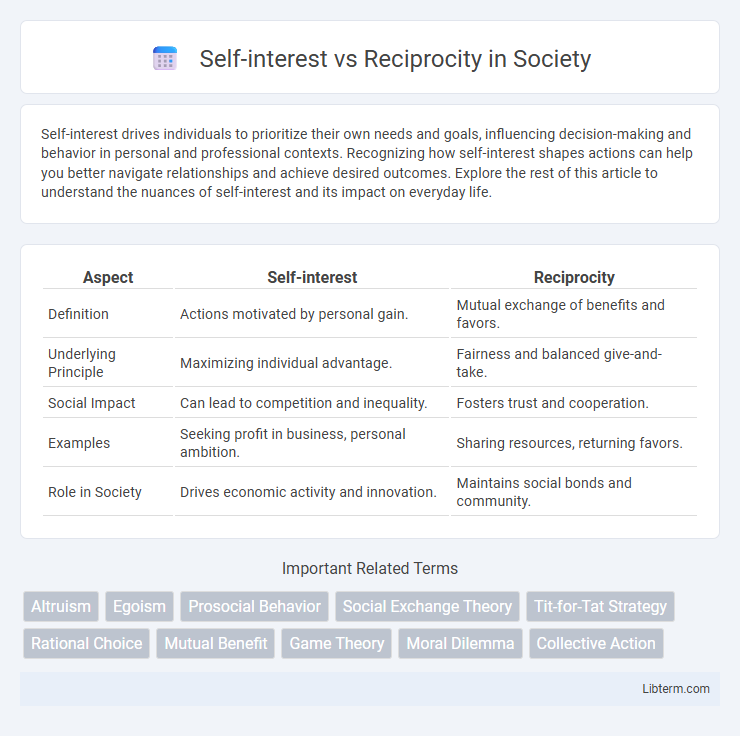Self-interest drives individuals to prioritize their own needs and goals, influencing decision-making and behavior in personal and professional contexts. Recognizing how self-interest shapes actions can help you better navigate relationships and achieve desired outcomes. Explore the rest of this article to understand the nuances of self-interest and its impact on everyday life.
Table of Comparison
| Aspect | Self-interest | Reciprocity |
|---|---|---|
| Definition | Actions motivated by personal gain. | Mutual exchange of benefits and favors. |
| Underlying Principle | Maximizing individual advantage. | Fairness and balanced give-and-take. |
| Social Impact | Can lead to competition and inequality. | Fosters trust and cooperation. |
| Examples | Seeking profit in business, personal ambition. | Sharing resources, returning favors. |
| Role in Society | Drives economic activity and innovation. | Maintains social bonds and community. |
Understanding Self-Interest: Definition and Motivation
Self-interest refers to actions driven by personal gain, where individuals prioritize their own benefits and well-being above others. This motivation stems from the desire to maximize personal advantage, often guiding decision-making in economic and social contexts. Understanding self-interest helps explain behavior in competitive environments where individuals seek to optimize rewards and avoid losses.
The Essence of Reciprocity: Meaning and Importance
Reciprocity involves the mutual exchange of benefits, fostering trust and cooperation between individuals or groups, which strengthens social bonds and community resilience. It contrasts with self-interest by emphasizing balanced relationships and long-term collaboration rather than immediate personal gain. The essence of reciprocity lies in recognizing the value of give-and-take interactions that promote fairness and collective well-being.
Historical Perspectives on Self-Interest and Reciprocity
Historical perspectives on self-interest and reciprocity reveal foundational debates in moral philosophy and economics, with Adam Smith emphasizing self-interest as a driving force in market behavior, while philosophers like David Hume highlighted reciprocity's role in social cohesion. Classical economics often framed self-interest as synonymous with rational behavior, yet anthropological studies show reciprocity as a fundamental principle in sustaining communities across cultures. This tension between individual gain and mutual exchange has shaped theories of human motivation and cooperative social systems throughout history.
Psychological Drivers Behind Self-Interest
Self-interest is driven by intrinsic psychological factors such as the pursuit of personal well-being, achievement, and the fulfillment of individual needs. Neural mechanisms involving the reward system, particularly dopamine pathways, reinforce behaviors that maximize self-benefit and survival. Understanding these drivers highlights how self-interest shapes decision-making processes and social interactions differently compared to reciprocity, which is motivated by mutual benefit and social exchange.
How Reciprocity Shapes Social Relationships
Reciprocity plays a crucial role in shaping social relationships by fostering mutual trust and cooperation between individuals. It creates a cycle of give-and-take where acts of kindness and support are returned, strengthening social bonds and enhancing group cohesion. Unlike self-interest, which prioritizes individual gain, reciprocity emphasizes interdependence and shared benefits in social interactions.
Self-Interest vs Reciprocity in Economic Behavior
Self-interest drives individuals to maximize personal gains and utility in economic behavior, often prioritizing outcomes that directly benefit themselves. Reciprocity influences economic interactions by encouraging exchanges based on mutual benefits and fair treatment, fostering cooperation and trust among parties. Understanding the balance between self-interest and reciprocity is crucial for predicting market dynamics and designing incentives that promote both competitive and collaborative economic outcomes.
Cultural Influences on Self-Interest and Reciprocal Actions
Cultural influences significantly shape the balance between self-interest and reciprocal actions, with collectivist societies emphasizing communal welfare and reciprocity over individual gain. In contrast, individualistic cultures often prioritize self-interest, fostering competitive behaviors focused on personal achievement and reward. These cultural norms impact social interactions, economic exchanges, and cooperative behaviors, highlighting the variance in motivational drivers across different cultural contexts.
Finding the Balance: Self-Interest Versus Altruism
Finding the balance between self-interest and reciprocity involves understanding how personal gain aligns with mutual benefit in social interactions. Self-interest drives individuals to prioritize their own needs, while reciprocity fosters cooperation through reciprocal exchanges that build trust and long-term relationships. Effective balance enhances social cohesion by blending altruistic behaviors with pragmatic self-focus, optimizing outcomes for both individuals and communities.
Real-World Examples: Self-Interest and Reciprocity in Action
In business negotiations, self-interest drives companies to maximize profits through competitive pricing strategies while reciprocity fosters long-term partnerships via mutually beneficial agreements and trust-building gestures such as timely deliveries. Online communities demonstrate reciprocity when users exchange helpful information and support, creating a collaborative environment that outweighs purely self-interested behaviors like spamming or trolling. Charitable organizations leverage reciprocity by encouraging donors to contribute through personalized thank-you messages and recognition, which enhances future giving beyond the initial self-interested motivation of altruism or tax benefits.
Fostering Reciprocity for Collaborative Success
Fostering reciprocity enhances collaborative success by promoting mutual trust and shared benefits, which encourages continuous cooperation among team members. Emphasizing reciprocal exchanges creates a balanced environment where individual self-interest aligns with collective goals, driving sustained productivity and innovation. Trust-based interactions and fair contributions increase commitment, enabling long-term partnerships that outperform purely self-interested approaches in complex projects.
Self-interest Infographic

 libterm.com
libterm.com